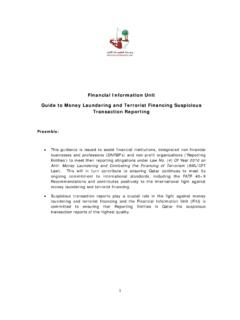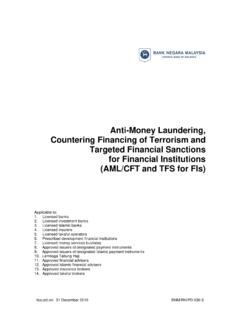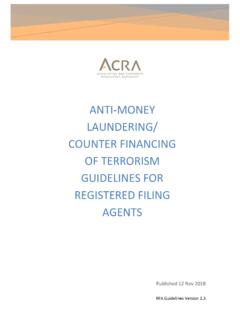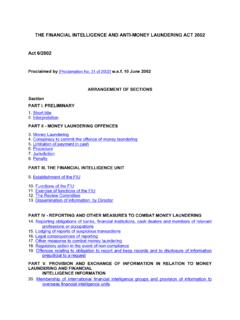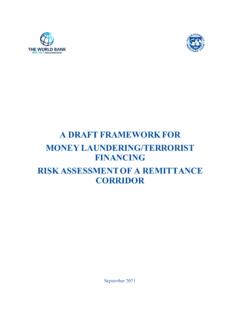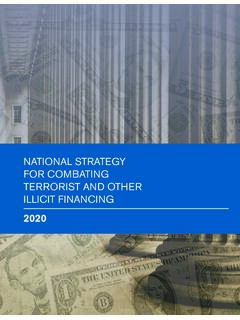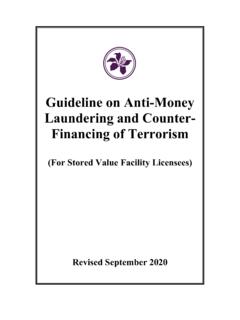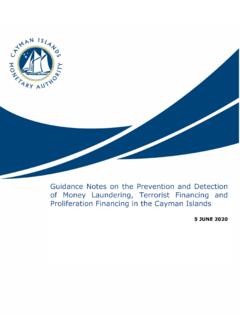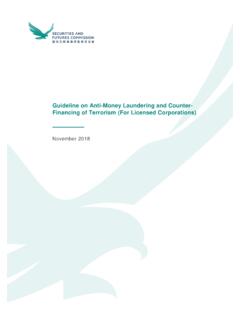Transcription of Law No. [20] of 2019 on Combatting Money Laundering and ...
1 Law No. [20] of 2019. on Combatting Money Laundering and terrorism financing We, Tamim Bin Hamad Al Thani, Emir of the State of Qatar, Having perused the Constitution; and The Law No. (4) of 1978 on the Control, Assaying and Stamping Precious Metals, amended by Law No.(12) of 1990;. The Law No. (8) of 1996 on Endowment and its amending Laws; and The Law No. (10) of 2002 on Public Prosecution and its amending Laws; and The Customs Law issued by Law No. (40) of 2002; and The Law No. (3) of 2004 on combating terrorism , amended by Decree Law No.(11) of 2017; and The Penal Code issued by Law No. (11) of 2004 and its amending Laws; and The Law No. (12) of 2004 on Private Associations and Foundations and its amending Laws; and The Criminal Procedure Code issued by Law No. (23) of 2004, amended by Law No.
2 (24) of 2009; and The Law No. (30) of 2004 Regulating the Auditing Profession; and The Decree Law No. (21) of 2006 on Private Foundations for the Public Benefit and its amending Laws; and The Advocacy Law, issued by Law No. (23) of 2006 and its amending Laws; and Law No. (4) of 2010 on combating Money Laundering and terrorism financing Law ; and The Law No. (8) of 2012 of Qatar Financial Markets Authority, amended by Decree Law No. (22) of 2018; and The Law of Qatar Central Bank and the Regulation of Financial Institutions issued by Law No. (13) of 2012; and The Law No. (6) of 2014 Regulating Real Estate Development; and The Law No. (15) of 2014 Regulating Charitable Activities; and The Law No. (11) of 2015 Promulgating the Commercial Companies Law; and The Law No. (22) of 2017 Regulating Real Estate Brokerage; and The Decree No.
3 (130) of 1990 on the Accession to the United Nations Convention against Illicit Traffic in Narcotic Drugs and Psychotropic Substances; and The Decree No. (17) of 2007 on the Ratification of the United Nations Convention against Corruption; and The Decree No. (10) of 2009 on the Accession to the United Nations Convention against Transnational Organized Crime of 2000; and The Decree No. (37) of 2012 on the Ratification of the Arab Convention against Corruption, and The Decree No. (20) of 2018 on the Accession to the International Convention for the Suppression of the financing of terrorism of 1999; and The Decision of the Council of Ministers No. (7) of 2007 on Establishing the National Counter terrorism Committee. The draft Law put forward by the Council of Ministers; and After having consulted the Advisory Council (Shura Council), Have decreed the following: Article (1).
4 The provisions of the Law on combating Money Laundering and terrorism financing , attached hereto, shall come into force and effect. Article (2). The Council of Ministers shall issue the Implementing Regulations for the attached Law. Until such regulations are issued, the current applicable decisions shall remain in force, provided that they do not contravene with the provisions of the attached Law. Article (3). All concerned parties subject to the provisions of the attached Law shall, within six months from the date of this Law coming into effect, make necessary arrangements to comply with its provisions. Such period may be extended for a similar period (s) by a Decision of the Council of Ministers. Article (4). The Law No. (4) of 2010 on combating Money Laundering and terrorism financing , and any provision inconsistent with the provisions of the attached Law, shall be repealed.
5 Article (5). All Competent Authorities, each within its own competence, shall implement this Law, which shall come into force on the day following its publication in the Official Gazette. Tamim Bin Hamad Al Thani Emir of the State of Qatar Issued at the Emiri Diwan on: 12/01/1440 Corresponding to: 11/09/ 2019 Law on Combatting Money Laundering and terrorism financing Chapter 1: Definitions Article (1). In the application of the provisions of this Law and its Implementing Regulations, the following terms and phrases shall have the meanings assigned thereto, unless the context requires otherwise: The Bank: The Qatar Central Bank. The Governor: The Governor of Qatar Central Bank. The Committee: The National Anti- Money Laundering and terrorism financing Committee, stipulated in Article (29) of this Law.
6 The Unit: The Financial Information Unit, stipulated in Article (31) of this Law. The Competent Authorities: Any public authority with specific AML/CFT. responsibilities. The Supervisory Authorities: Competent authorities responsible for licensing or supervising financial institutions, Designated Non-Financial Businesses and Professions (DNFBPs) and Non-Profit Organizations (NPOs), or for ensuring compliance thereof with the AML/CFT requirements, as stipulated in the Implementing Regulations. The Authority: The Regulatory Authority for Charitable Activities. The Predicate Offence: Any act constituting a misdemeanour or a felony under any Law in force in the State, whether committed inside or outside the State, whenever it generates funds and is an offence punishable by law in both countries.
7 Instrumentalities: Everything used or intended to be used, in whole or in part, in the commission of any Money Laundering or terrorism financing offence. Proceeds of crime: Any funds derived or obtained, directly or indirectly, from committing predicate offences, including the income, interest, revenue or other product, whether or not it has been transferred in whole or in part into properties or investment proceeds. Funds: Assets or property of every kind, whether physical or non-physical, tangible or intangible or movable or immovable, including financial assets and economic resources such as oil and other natural resources, and all related rights, of any value, however acquired, and all legal documents or instruments in any form, including electronic or digital copies, evidencing title to, or share in, such assets and any interest, dividends or other income on or value accruing from or generated by such funds or other assets, which can potentially be used to obtain funds, goods or services.
8 Terrorist Act: a) Any act which constitutes a terrorist offence under the combating terrorism Law or under international treaties related to terrorism to which the State is a party. b) Any other act intended to cause death or serious bodily injury to a person, where such person is not taking an active part in the hostilities in the situation of armed conflict, when the purpose of such act, by its nature or context, is to intimidate a group of people or to compel a government or an international organization to do or abstain from doing a certain act. Terrorist: Any natural person who intentionally commits any of the following acts: a) Commits or attempts to commit, terrorist acts, by any means whatsoever, directly or indirectly, unlawfully and wilfully;. b) Participates as an accomplice in terrorist acts.
9 C) Organizes or directs others to commit terrorist acts; or d) Contributes to the commission of terrorist acts by a group of persons acting with a common purpose and with the aim of furthering the terrorist act or with the knowledge of the intention of the group to commit a terrorist act. Terrorist Entity: Any group of terrorists that commits intentionally any of the following acts: a) Commits, or attempts to commit, terrorist acts by any means, directly or indirectly, unlawfully and wilfully;. b) Participates as an accomplice in terrorist acts;. c) Organizes or directs others to commit terrorist acts; or d) Contributes to the commission of terrorist acts by a group of persons acting with a common purpose and with the aim of furthering the terrorist act or with the knowledge of the intention of the group to commit a terrorist act.
10 Freeze: Prohibiting the transfer, conversion, disposition, movement, of funds or equipment or other instrumentalities, on the basis of, and for the duration of the validity of, a decision of a competent authority, or until an unfreezing order is issued or the Competent Court issues a confiscation order. Seizure: Prohibition imposed on transfer, conversion, disposition, movement, or transport of funds on the basis of, a decision issued by a judiciary authority or a competent authority, which actively take control of and manage the funds, throughout the duration of the decision. Confiscation: Permanent deprivation of funds by virtue of a judicial ruling. Financial Institution: Any person who conducts, as a business, one or more of the financial activities or operations for or on behalf of a customer, as set forth in the Implementing Regulation.

